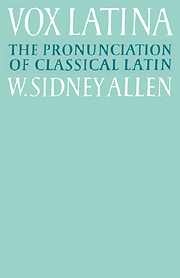Summary
There is little disagreement that the prehistoric accent of Latin was a stress accent, and that this fell on the first syllable of the word. Its effects are seen in the loss or weakening of vowels in the unaccented syllables, which is typical of strong stress in some other languages (compare, for instance, English had with Gothic habaida). Thus e.g. aetas, pergo, quindecim from áeuotas, pérregoy quinquedecem; conficio, confectus from cónfacio> cónfactus; incīdo, conclūdo from íncaedo, cónclaudo. There may perhaps be a survival of this initial accent in the senarius in such forms as fǎcǐlǐǎ, cěcǐděrō, though this is disputed.
But certainly by classical times the principles governing the position of the accent had completely changed in accordance with what is usually called the ‘Penultimate Law’. By this, the accent in polysyllables falls on the penultimate if this is of heavy quantity, and on the antepenultimate (regardless of quantity) if the penultimate is light: thus e.g. con-fé;c-tus, con-fí-ci-o.
Whilst these rules are quite clear, however, and unambiguously stated by the grammarians (cf. † Quintilian, i, 5, 30), there is some controversy about the nature of the historical accent, namely whether it was one of stress (as in prehistoric Latin or modern English), or of musical pitch (as in classical Greek).
The latter view, which is held mainly by French scholars, certainly seems to have support in the statements of many of the ancient sources, e.g. Varro (cited by Sergius, K. iv, 525 ff.): ‘Ab altitudine discernit accentus, cum pars uerbi aut in graue deprimitur aut sublimatur in acutum.’
- Type
- Chapter
- Information
- Vox LatinaA Guide to the Pronunciation of Classical Latin, pp. 83 - 88Publisher: Cambridge University PressPrint publication year: 1978



